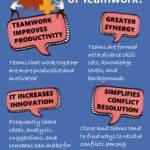
The 1-2-4-All Method to Generate Ideas
The 1-2-4-All Method is a variant of the Brainstorming technique and aims to create solutions in a collaborative manner, starting from a given topic. The process consists of involving everyone in generating questions, ideas and suggestions, gradually encouraging team members to think, first individually and then in larger and larger groups.
Before starting the workshop, the facilitator sets the context by stressing the need for a benevolent, respectful and non-judgmental approach: this is central to this method. The facilitator then presents a common topic in the form of a single question.
As time is limited, the question must be clearly explained. Otherwise, the results may be difficult to interpret and will not allow the team to meet the objective.
Four 12-minute stages
Once the context and question have been clearly set out, the workshop can begin. There are four stages:
- Step 1, Silent self-reflection by individuals (1 minute): Everyone takes time to themselves to jot down their ideas on the question.
- Step 2, Generate ideas in pairs (2 minute): The group is then split into pairs. They generate ideas based on their own personal thoughts. This stage helps share and feed the thought process.
- Step 3, Share and develop ideas from your pair in foursomes (4 minutes): The pairs are now gathered into small groups of 4. Now’s the time to identify the similarities and differences between the ideas stemming from the pairs. This stage aims to share, filter duplicates and feed the thought process by strengthening the agreements and discussing any divergent points of view.
- Step 4, Each group shares one important idea with all (5 minutes): The foursomes get together. The facilitator asks the whole team: ‘What main idea has emerged from your discussions? ‘. Each group shares their main idea in turn, which helps to highlight the key ideas.
Depending on the level of complexity of the topic, the facilitator can allow more time for each stage if necessary. However, keep time slots as short as possible so as not to affect the workshop, which is meant to be quick and to-the-point.
The workshop can be run several times, with different questions.


